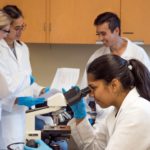 Teams working from different locations are less likely to come up with groundbreaking ideas compared to those working together in the same place, according to a study by the universities of Oxford and Pittsburgh.
Teams working from different locations are less likely to come up with groundbreaking ideas compared to those working together in the same place, according to a study by the universities of Oxford and Pittsburgh.
The main finding is that although remote collaboration can offer new and creative scientific thoughts by tapping into a global pool of knowledge, it’s harder for these teams to work together effectively and achieve breakthroughs.
“The computer revolution and the rise of the Internet has connected talent from all around the world yet, rather than accelerating as many predicted, studies have shown that breakthrough innovation is in decline,” the researchers explain.
“Our paper provides an explanation for why this happens: while remote collaboration via the internet can bring together diverse pools of talent, it also makes it harder to fuse their ideas.”
Supercharging innovation
“Today, there is much talk about Artificial Intelligence supercharging innovation,” they continue. “Yet many predicted the same with the advent of the PC and the Internet. This should serve as a reminder there is unlikely to be a pure technological solution to our innovation problems.”
The team examined over 20 million research papers from 1960 to 2020, involving 22.5 million scientists across 3,562 cities. They also studied four million patents filed between 1976 and 2020, with 2.7 million inventors in 87,937 cities.
During this period, they found:
- The average distance between team members for papers increased from 100 kilometers to nearly 1,000 kilometers, and for patents, from 250 kilometers to 750 kilometers.
- The proportion of very long-distance collaborations (over 2,500 kilometers, like from Brazil to Liberia) rose significantly from 2% to 15% for papers and from 3% to 9% for patents.
- Despite these changes, researchers in remote teams were consistently less likely to make groundbreaking discoveries compared to their onsite counterparts.
- Remote teams were also less likely to engage in conceptual tasks crucial for breakthrough research, like conceiving research ideas or writing papers. However, they were more likely to contribute to technical tasks such as conducting experiments and analyzing data.
The team suggests that their findings have important policy implications. The widespread shift to remote work post-pandemic could lead to smaller and more gradual improvements in scientific research but might pose challenges for achieving breakthroughs. Hence, they emphasize that while investing in digital infrastructure is essential, it should not overshadow the importance of investing in physical infrastructure to reduce travel costs and enhance housing affordability.
“True innovation often has a hometown,” the researchers conclude. “This is because geographical proximity breaks hierarchy, enabling flat team structures and intensive communication essential for conceiving groundbreaking ideas.
“It is easier, for example, for a graduate student to discuss informally ideas with a senior professor in a hallway than through email. Even with digital advancements, online meetings cannot fully replace the unique value of face-to-face interactions in fueling innovation.”